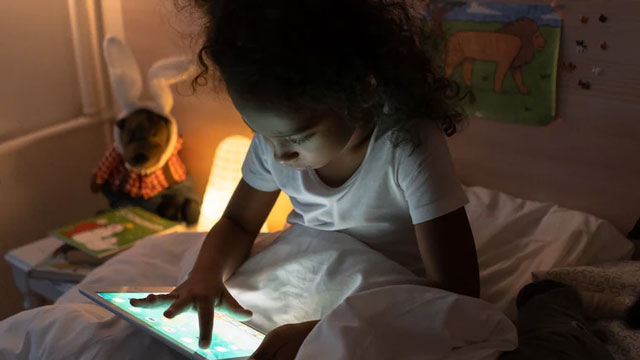Daijiworld Media Network- New Delhi
New Delhi, Aug 14: In today’s gadget-driven era, smartphones, online classes, gaming, and streaming have become a part of children’s daily routine — often extending late into the night. However, a recent study published in the Journal of the American Heart Association has raised a serious health alarm, linking prolonged leisure screen time to increased cardiometabolic risk in children and teenagers.
The study found that each additional hour spent on non-academic screen activities — such as scrolling social media, binge-watching shows, or gaming — raises the risk of heart-related issues in later life. Researchers highlighted that poor sleep habits further intensify the risk.

The research, based on over 1,000 parent-child and adolescent pairs in Denmark, revealed that:
• Every extra hour of screen time increased cardiometabolic risk by 0.08 standard deviations in children (6–10 years) and 0.13 in adolescents (18 years).
• Inadequate or late-night sleep amplified the harmful effects.
• Better sleep could offset up to 12% of the damage caused by excess screen exposure.
• A unique “screen time fingerprint” of 37 blood-based biomarkers was found, linking prolonged screen use to metabolic changes.
Though conducted overseas, experts say the findings are highly relevant to India, where children’s screen time has surged in recent years, especially post-2020 due to online classes and digital entertainment. Rising cases of childhood obesity, insulin resistance, and poor sleep patterns in Indian households mirror the study’s concerns.
Simple steps to protect children’s health
Health experts recommend parents and guardians take proactive measures to curb screen addiction:
• Limit leisure screen time to under two hours daily, excluding school work.
• Create screen-free zones such as dining tables and prayer areas.
• Avoid gadgets at least one hour before bedtime to improve sleep quality.
• Encourage physical activity — from outdoor play to indoor dancing — to keep the heart healthy.
With heart-related ailments increasingly affecting younger populations, experts stress that timely lifestyle changes can safeguard children’s health for decades to come.